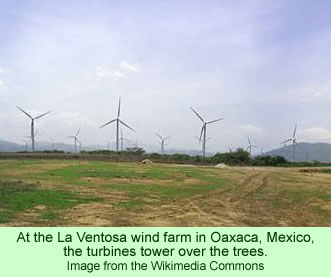While Bloomberg BusinessWeek last week trumpeted the recent Mexican economic powerhouse, some poor, marginalized communities in that country, such as those of the Zapotec, appear to be increasingly repressed.
 The Independent European Daily Express, a news organization based in the Netherlands, carried an IPS story on its website last week announcing that a community radio station in Oaxaca had been shut down by the government. The move by the authorities follows, and seems to be related to, very contentious community reactions to a disputed wind farm, which provoked a lot of opposition and controversy last year.
The Independent European Daily Express, a news organization based in the Netherlands, carried an IPS story on its website last week announcing that a community radio station in Oaxaca had been shut down by the government. The move by the authorities follows, and seems to be related to, very contentious community reactions to a disputed wind farm, which provoked a lot of opposition and controversy last year.
Radio Totopo, broadcasting from the Pescadores neighborhood of Juchitán, a small, primarily Zapotec city in Oaxaca, had been on the air since 2006. About 90 percent of its programming was in the language spoken by the local Zapotec people. Pescadores is in the oldest and poorest part of the city. Like most community radio stations in Mexico, the station had no operating license, so the authorities seized all the equipment and shut it down at the end of March.
The station had supported the causes of the local poor people, the farmers and fisherfolk, particularly in their fight to prevent the installation of an industrial wind farm on communal lands. Radio Totopo translated contracts into the local Zapotec language, called Diidxazá, and broadcasted them. It publicized issues raised by opponents to the industrial development until March 26 when the state police arrived to remove equipment, the transmitter, a computer, and evict the station from the site.
During the confrontation with the authorities, Carlos Sánchez, one of the coordinators of the station, suffered a broken arm. He is now in hiding. Mariano López Gómez, a leading opponent of the wind farm, was detained for several days.
All of this has been going on, oddly, while the Mexican parliament has been debating a constitutional reform that will guarantee the rights of community and indigenous radio stations. The success of the new law is uncertain, but some voices in Oaxaca cynically disparage the process.
Óscar Ledima Santiago, a coordinator of the repressed Radio Totopo, said that the proposed law “is useless to us.” He added that the “debate is a lie, because the radio stations are being subjected to repression for defending people’s rights, and by the time the secondary regulations are passed, there won’t be any land left to fight for.”
Other community radio stations have also been harassed for supporting the efforts of local people to control their own lands and resources. Two reporters from the Radio Voces de los Pueblos were held for a couple hours on March 21, and a couple days later, Filiberto Vicente from Radio Xadani said that he had received death threats. Radio Huave, another community station, has had its transmitting equipment stolen.
In all of those instances, the stations had become involved in supporting the resistance of indigenous people to large mining or energy development projects. A group called the Assembly of Peoples of the Isthmus in Defence of Land and Territory said, in a communiqué, “we demand a thorough investigation of these attacks, and punishment of the officials and company owners linked to the violation of our right to information.”
The enthusiastic Bloomberg BusinessWeek story about the vibrant Mexican economy does admit that the country still has many problems, such as weakness in its public institutions, rampant corruption, and an underdeveloped rule of law. Trampling on the rights of indigenous peoples, especially when they get in the way of profitable energy developments, could be included on the list.